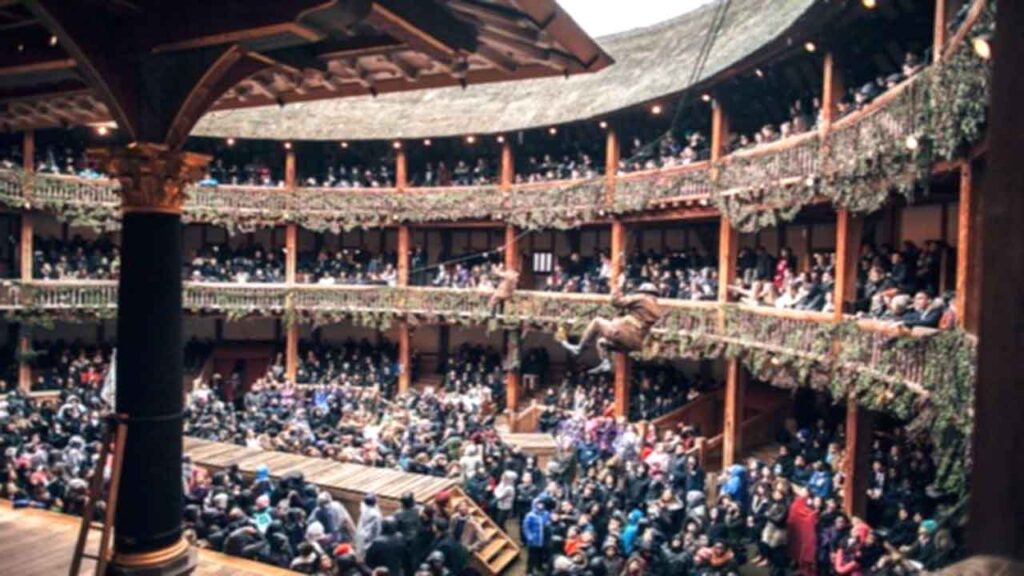Elizabethan Theatre: The Elizabethan Theatre and Audience times were the Golden era of drama
The Elizabethan Theatre and Audience
Elizabethan times were the golden era of drama and produced many great playwrights like Christopher Marlowe and Ben Jonson besides Shakespeare. The theatre in those days was very different from the modern times.
There were no curtains or lights and the plays were performed during the day. This put a lot of burden on the writer and the imagination of the audience. There were no movable sets or sceneries except just a few properties like trees, tables and chairs and elaborate costumes.
The theatre was hexagonal in shape while the stage itself was round without any walls around and had rooms at the back. The poorer people generally stood throughout the play and their place was right in front of the stage. In fact, the stage jutted into the pit where the poor spectators stood so that they could almost touch the actors.
Behind the pit were rows and rows of seats for the middle class viewers and above them were rooms or boxes for the gentry. Since the audience was so close to the actors, it was a common practice for actors to talk directly to them as in the famous soliloquies or the asides.
Thus the stage itself had four parts : the part that extended right into the pit; the back stage behind the pillars which was used for scenes that took place in a room or a palace. On the two sides at the back were the entrance and the exit which were used for the actors to come and go.
These two doors were placed at a considerable distance from the stage so there was often a character informing the audience of the arrival of another character though it would take him some time to actually appear. The third part of the stage was the inner stage which was right at the back and had a door and the room was used for rare scenes like action near a tombstone, a pub etc.
The fourth part was a balcony above used for scenes like Juliet talking to Romeo or Jessica waiting for Lorenzo before her elopement in ‘The Merchant of Venice’.
Since there was no movable property or curtains, verbal clues had to be given before the change of scene. Shakespeare used a unique way- that of couplets- to indicate the end of a scene. Similarly, the time of day had to be suggested by the characters like some character remarked about the darkness of night or talked of the moonlight like in Julius Caesar, Act 2 Scene 1, the conspirators discuss which direction the sun will lise, clearly indicating that it is the time slightly before the day break. In Act 2 Scene 2, Caesar is shown directly asking the time and Brutus tells ‘’tis strucken eight’.

Another very interesting feature of Shakespearean stage was that the role of women was undertaken by young boys because women had not come into acting. Perhaps that explains why there are no tragedies about women and they play a minor role in tragedies.
The Elizabethan audience also played a major role in shaping the plays. Remember plays were written strictly for performances and not for publication. The poorer lot of audience loved horse play, song and dance (As You Like It is full of songs), ghosts and spirits and crude jokes.
Shakespeare’s life शेक्सपियर: विलियम शेक्सपियर का जीवन (Shakespeare’s life) हिंदी में
In ‘Julius Caesar’ the play begins with Flavius howling king ‘‘Commoners’’, as if he is directly addressing the crowd that came to witness the paly. The audience must have been excited to hear the vivid description of the supernatural element in Act 1 Scene 3 and Act 2 Scene 2.
The greatness of Shakespeare lay in his having interwoven these elements in the main fabric of the play. In his later, more mature works, the ghosts and spirits were not simply an addition but were an integral part of the play as in Hamlet and Macbeth. In ‘Julius Caesar’, it is the spirit of Julius Caesar that dominates the later half of the play.
The clown also served a useful purpose of lessening the tension and in his historical plays, he was one man who spoke his mind and could take liberties even with the king. It is no wonder, then, that Shakespeare was so sought after in his day.

